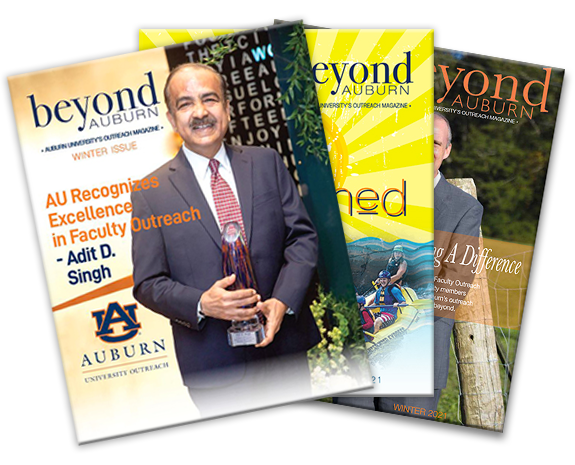Beyond Auburn Magazine
Summer 2018: "Growing Effective Leaders"
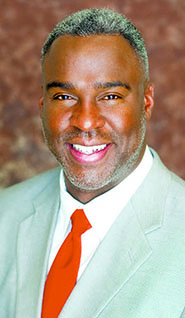
Every spring semester, we dedicate the issue of Beyond Auburn to the latest recipient of the Auburn University Award for Excellence in Faculty Outreach. The Award for Excellence is Auburn’s highest recognition of engaged scholarship and one of the university’s premier annual faculty awards. Over the last 10 years, we’ve profiled in Beyond Auburn some of Auburn’s most outstanding scholars and their incredible outreach. This year’s featured award recipient is Don Mulvaney, associate professor in the College of Agriculture’s Department of Animal Sciences.
Dr. Mulvaney received the Award for Excellence in Faculty Outreach at the university’s recognition ceremony in February. He is nationally recognized for his work developing and leading outstanding leadership programs supporting Alabama’s beef industry, which has the third highest economic impact of all industries in the state. His work benefits stakeholders across Alabama as well as serving as an inspiring model for other states to emulate. Don has also been tireless in his advocacy of strong leadership and scholarship among Auburn’s faculty and student communities, as well as in our academics, administration, and university governance. Congratulations, Don, for receiving this peer tribute to your dedicated outreach and faculty engagement!
The Award for Excellence is just one of many ways we recognize faculty engagement. Our competitive Outreach Scholarship Grants program and engagement project funding has helped support more than 400 faculty outreach initiatives in every college and school on campus – more than $5 million awarded in the last decade. Significantly, these funds are not drawn from university appropriations, but are generated from our Professional and Continuing Education external revenues. Thus, University Outreach is channeling its productivity back into the university to benefit faculty by investing in their scholarly engagement.
These programs serve not only to recognize, celebrate and support excellent scholarly engagement, but also present opportunities to collaborate with others. We are committed to expanding the base for faculty engagement by building partnerships within the university as well as with communities beyond campus – particularly those historically underserved in our state. By working together, strategically, consistently, and urgently, we can meet the changing needs of society, and increase the quality of life for the public we serve.
The profiles and stories within this issue of Beyond Auburn are sure to inspire you to be a part of the great outreach mission of Auburn University. We welcome the opportunity to work with you and to join us in making a difference!
War Eagle,
Royrickers Cook, Vice President for University Outreach and Associate Provost

Auburn Youth Programs offers over 100 summer programs designed to educate and inspire youth in a variety of academic, athletic, and extracurricular endeavors. Participants have the opportunity to further their education and skills while making new friends and experiencing life at Auburn University. Check out all of the available camps this summer: www.auburn.edu/summercamps.
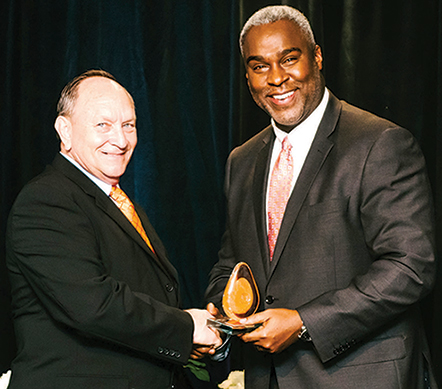
Alabama’s beef cattle industry has the third largest economic impact among all the state’s industries, and a major contributor to the growth and continued impact of this major industry is Don Mulvaney.
Mulvaney, associate professor in Auburn’s Department of Animal Sciences, is this year’s recipient of the Auburn University Award for Excellence in Faculty Outreach. The award, which is Auburn’s highest recognition of engaged faculty scholarship, was presented to Mulvaney at the university’s award program in February.
“Dr. Mulvaney has distinguished himself through an outstanding record of outreach to Alabama’s important beef industry,” says Royrickers Cook, Auburn’s vice president for University Outreach. “Don’s contributions to animal sciences, agriculture and leadership development across the state have significantly helped communities adapt and excel through challenging times.” Cook also noted Mulvaney’s extensive record of service at the University. “Don has been a tireless leader on campus as well, through the University Senate and countless task forces and committees at Auburn.”
Mulvaney attended the University of Illinois, receiving his bachelor’s degree in agricultural science with a dual major in animal science and agricultural education. He received his master’s and doctoral degrees from Michigan State in animal husbandry, majoring in growth and muscle biology-physiology. He joined the Auburn faculty in 1983. In his 35 years at Auburn, Mulvaney has received numerous awards and recognitions for his teaching and academic excellence, including the College of Agriculture’s Teacher of the Year (1991), Dean’s Award for Teaching Excellence (1994 and 2004), Biggio Center Faculty Fellow (2004-2006), Extension System Service Award (2004), SGA Outstanding Faculty Award (2007 and 2008), and was twice nominated for the Alumni Teaching Award.
Applying his professional expertise to directly benefit stakeholder groups and citizenry across the state, southeast and nation, Mulvaney has organized many programs over the years, particularly in the area of youth leadership in the cattle industry. Among these are the annual AU Beef Cattle Conference serving beef producers and allied industries from throughout the southeast. Mulvaney also developed the Alabama Cattlemen’s Association Young Cattlemen Leadership Program, a year-long course promoting leadership concepts and skills needed to address issues facing modern beef production. The Alabama Beef Ambassador Program prepares youth, ages 9 to 20, with foundational skills and coaching to compete in the Southeast Regional Beef Ambassador Leadership Conference and Competition.
The impact of these programs is well documented and far-reaching. Alumni of the leadership programs have assumed elected and civic positions in communities across Alabama, and many young participants of Junior Cattlemen programs have become leaders in the state’s cattle industry. Ambassador teams have competed successfully in national events, and one state winner became a member of the national beef ambassador team.
While these contributions to the economic impact of the state are critically important, Mulvaney’s work has global import as well. The United Nations’ Food Agriculture Organization predicts global food production will need to increase by 70 percent in order to prevent food insecurity, thus rural communities around the world must develop effective leaders to support and expand agricultural industry.
According to Department of Animal Sciences head Wayne Greene, Mulvaney has contributed significantly to both youth and adult outreach programs in support of the department’s mission in the beef cattle industry of Alabama and the nation. “Alabama was not a participant in the National Beef Ambassador Program for a number of years,” notes Greene. “Dr. Mulvaney recognized a void for the youth of Alabama and took initiative outside of his regular teaching/research duties to train youth for a state-wide competition as Beef Ambassador that would be competitive in the National Beef Ambassador program.” The next year, an Alabama youth participant in Mulvaney’s program was selected among students nationwide as one of five beef ambassadors.
In the years since, Mulvaney has continued to conduct these youth programs while developing a broad range of programming promoting leadership in the beef industry. “Dr. Mulvaney’s leadership and program development was the spark that lit this flame,” says Greene. “He continues to be a positive role model for youth and young adults in developing quality programming in support of the third leading economic impact in Alabama – BEEF.”
Industry leaders echo the praise for Mulvaney’s work. “Dr. Mulvaney’s vision and solid practice of ‘how to be a leader’ has resulted in a significant number of our young cattle producers becoming involved on their county boards and at the state level,” says Erin Beasley, assistant executive vice president of the Alabama Cattlemen’s Association. “He is one of the best assets of the state of Alabama and one of the best assets of the American beef industry,” exclaims Brian Smith, a regional vice president in the association.
Evelyn Brown, chair of the American National Cattlewomen’s Association, notes that Mulvaney sets high goals as he provides opportunities promoting all aspects of the beef industry. “Overall, Dr. Mulvaney has my respect and the respect of many state and national leaders as he continues to provide excellent programs related to our livelihood, says Brown. “Dr. Mulvaney’s programs are valued and have a positive impact on our industry regionally and nationally.”
Don Mulvaney’s approach to leadership starts with “a realization that it is the most important thing that we could improve in.” “Leadership impacts the home, impacts the family, individuals, organizations, basically our culture cries out for improved and more effective leadership,” says Mulvaney. “Relationship building is important too. Effective leaders have to grow and constantly improve in the way that they interact with others.”
In addition to his disciplinary focus in Animal Sciences and leadership development work, Mulvaney’s career at Auburn has been varied. “When I came to Auburn, I was a scientist,” reflects Mulvaney. “I still consider myself a scientist [but] my journey has taken me to be involved in administrative things.” His administrative contributions have been wide-ranging, including an appointment with the Biggio Center as a faculty fellow; work on the student services team for Camp War Eagle; student career counseling; and advising for the SGA and other student organizations. He is currently serving a term as secretary of the University Senate.
Through all of his significant scholarly accomplishments, Mulvaney has aspired to make a difference in the lives of those Auburn serves. “As I look back at all the things I’ve been engaged in, receiving this award makes it pretty special,” says Mulvaney. “What we do here changes the world, be it our research, our work in the classroom, and outreach; to touch other individuals and communities and stakeholders is pretty significant.”
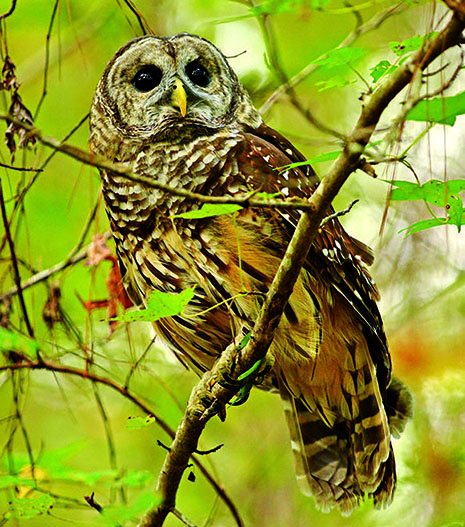
The Alabama Birding Trails has announced that Auburn University’s Louise Kreher Forest Ecology Preserve, informally known as the Kreher Preserve and Nature Center, will be designated as an Alabama Birding Trail location as part of the regional Piedmont Valley Birding Trail. The 120-acre preserve, located just north of Auburn, features five miles of well-marked trails which traverse seven natural bird habitats including pine, oak/hickory, bottomland hardwood and mixed pine/hardwood. As part of the Saugahatchee Creek Watershed, visitors will also find a stream, small waterfall, pond and wetland areas.
Approximately 80 different bird species can be found on the property throughout the year, including the belted kingfisher, Mississippi kite and indigo bunting. The preserve habitat hosts migratory birds in the spring such as warblers, vireos, tanagers and orioles. Fall and wintering birds such as nuthatches, kinglets and woodpeckers are frequently observed. Visitors to the Kreher Preserve are also able to observe various species of raptors including hawks, owls and vultures. Nesting bald eagles are present on nearby properties and are frequently observed flying into and over the preserve.
“The Kreher Preserve and Nature Center is enjoyed by the university community as well thousands of locals and visitors every year,” said Janaki Alavalapati, dean of the Auburn University School of Forestry and Wildlife Sciences. “We hope that by adding it to the Alabama Birding Trail even more families will be exposed to the opportunity to enjoy this unique discovery center with its miles of beautiful trails, natural habitats and educational programs.”
Preliminary findings from the U.S. Fish and Wildlife Service’s 2016 National Survey of Fishing, Hunting and Wildlife-Associated Recreation estimates that in 2016, more than 101 million Americans – nearly 40 percent of the U.S. population – participate in some form of fishing, hunting or other wildlife-associated recreation such as birdwatching or outdoor photography.
“The economic impact of outdoor and wildlife-related recreation is a boon for the U.S. economy representing nearly 1 percent of the gross domestic product,” said John Wild, president of the Auburn Opelika Tourism Bureau.
“With the addition of the Kreher Preserve and the Lee County Fishing Lake to the growing list of birding sites in Lee County, including the Wood Duck Preserve and Chewacla State Park, we anticipate the new designations will draw more people to the Auburn/Opelika area who will also visit our hotels, enjoy meals in restaurants and make retail purchases while they are here,” said Wild. The Kreher Preserve and Nature Center is located at 2222 North College St. in Auburn. It is open to the public every day from sunrise to sunset and features amenities such as a picnic area, restrooms, drinking fountains, boardwalks and two improved parking areas. The preserve was established in 1993 with a gift of land from Louise Kreher Turner and Frank Allen Turner to Auburn University and is operated by the School of Forestry and Wildlife Sciences as a not-for-profit outreach program.
The Alabama Birding Trails is a partnership of the Alabama Department of Conservation and Natural Resources, the University of Alabama Center for Economic Development and the Birmingham Audubon Society. It highlights many of the birds found in Alabama and encourages economic development through a tourism-based model. More information about the Kreher Preserve and Nature Center can be found online at http://wp.auburn.edu/preserve. More information about Alabama Birding Trails can be found online at https://alabamabirdingtrails.com/.
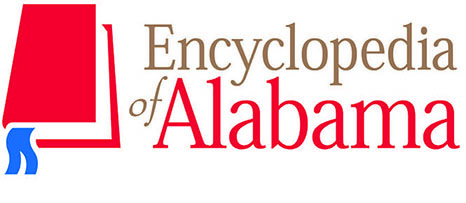
Behind a set of double doors on the first floor of the original Ralph Brown Draughon Library building, near the offices for interlibrary loans and government documents, is the editorial office of the Encyclopedia of Alabama (EOA). It is here that Alabama’s premier online educational resource has expanded during the past 10 years from 500 articles to more than 2,000 covering the state’s history, culture, and natural environment.
The content for this award-winning site is commissioned, edited, updated, coded, and promoted in a space decorated with oversized posters made from old black and white photos (including one of workers with an unattached leg of the giant iron Vulcan), an image of the patron saint of candy makers (St. Macarius of Alexandria), and Star Wars memorabilia. The electronic nature of the staff’s work is highlighted by the presence of multiple monitors on each desk, but there are also books pulled from the library’s shelves for fact-checking purposes, and lists and notes recorded on ruled notepaper. Close at hand are recently published books about Alabama, many containing acknowledgments that thank the EOA staff for its assistance.
When EOA launched in the Fall of 2008, its advocates knew the site would be a welcomed resource for scholars and teachers. But even EOA’s most ardent promoters didn’t anticipate how wide the site’s reach would become. Visits have been recorded from more than 200 countries and territories. During the past 10 years, EOA has attracted more than seven million visitors, who have generated more than 14.5 million pageviews. That’s approximately two discrete pages of information per visit. The average number of monthly visitors is 71,000, and that number jumps past 80,000 when school projects are due. Most of EOA’s visits are from the United States (91 percent), with about 28 percent of the traffic from Alabama itself. Articles most popular with visitors from Alabama include the entries on birds, insects, agriculture, and minerals.
EOA’s growing value as a credible source of information about Alabama is demonstrated in a variety of ways. There are now online lesson plans for Alabama’s teachers and assignments for students with links to EOA content. Its articles are quoted in international and national news publications. The phrase “according to the Encyclopedia of Alabama” is routinely seen in Alabama newspapers. The staff is no longer surprised to see EOA cited in footnotes or a bibliography. Site traffic is generated with exposure on social media. One notable instance was the day the composer of a popular Broadway musical tweeted a link to the EOA article about Aaron Burr’s arrest in Alabama in 1807. Web pages that promote “this day in history” or “today I learned” content frequently feature a link to an EOA article.
If you aren’t one of the millions who have visited the site at www.EncyclopediaofAlabama.org, you should do so soon. No doubt there are at least three articles that will appeal to you.
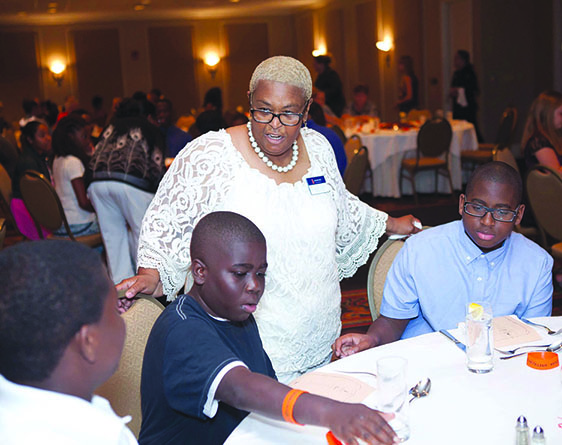
This January marked the one-year anniversary of the formation of the Center for Educational Outreach and Engagement (CEOE) Network. The CEOE Network was organized to galvanize and enhance the communication and profile of units engaged in K-12 educational outreach with a commitment to expanding the Auburn University footprint in this arena.
Some 15 units across campus have joined the CEOE Network to encourage Auburn University faculty and staff to connect with colleagues engaged in K-12 outreach to enhance educational development partnerships. The Network will serve as an opportunity to collaborate when appropriate and collectively act in an efficient manner. Through the Network there will be collaboration on grants, educational development opportunities and K-12 activities locally, nationally and internationally. By using an interdisciplinary approach to problem solving in the K-12 arena, Auburn University will further opportunities for research and publications through the Network.
“We are very excited about our first upcoming Network collaboration which involves the CEOE/University Outreach submission of a $20-million-dollar GEAR UP grant in the spring. Campus units including theater, computer engineering and Inclusion and Diversity have already agreed to serve as matching partners in this effort and we hope other units will join us in this incredible opportunity,” according to Stacey Nickson, CEOE director.
CEOE Network meets quarterly to: enhance collaboration and coordination on K-12 outreach grants and educational development opportunities; share information about initiatives and best practices in K-12 educational outreach; offer expertise and guidance to promote K-12 outreach both locally and globally and disseminate essential knowledge and skills fostering effective K-12 educational practices. Any units interested in being represented in the Network should contact Stacey Nickson directly at snickson@auburn.edu.
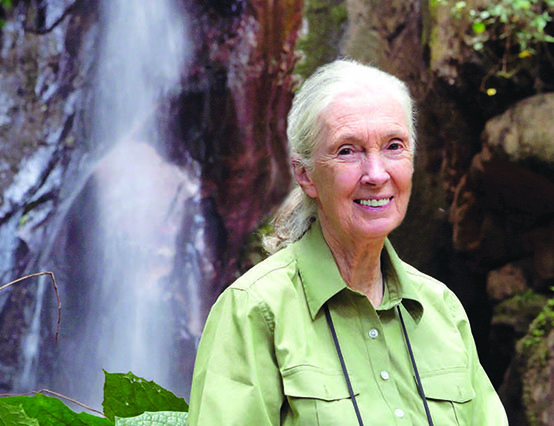
The 16th Annual Women’s Philanthropy Board (WPB) Spring Symposium and Luncheon, held on Monday, April 16, featured keynote speaker Dr. Jane Goodall, DBE, legendary chimpanzee researcher, founder of the Jane Goodall Institute, and UN Messenger of Peace. The annual symposium served as the culminating event in WPB’s yearly outreach programming which celebrated the 2017-2018 theme of “Philanthropic Trailblazers…Creating a Legacy Together.”
Dr. Goodall’s keynote address capped off this year’s Spring Symposium educational program offerings which also included presentations by two trailblazing women in finance.
Cathy Saunders, a 30-year veteran of the financial services industry, serves as Putnam Investment’s head of registered investment advisory business. Saunders shared that “Women control more wealth today than ever before” and her presentation, “Empower, Elevate, & Achieve: A Financial Guidebook for Women,” provided the audience with critical advice on how to manage their wealth.
Brie Williams, vice president and head of practice management for State Street Global Advisors, gave insight into the purpose and creation of the “Fearless Girl” statue through her presentation, “The Power of Women in Leadership: The Making of the Fearless Girl.” Williams was instrumental in State Street’s 2017 commission and installation of the statue opposite the “Charging Bull” statue in New York City’s financial district. The “Fearless Girl” statue was designed to promote workplace gender diversity and encourage companies to recruit women to their boards. The plaque below the statue states, “Know the power of women in leadership. SHE makes a difference.”
As founder of the Jane Goodall Institute, Dr. Goodall serves as the leader and force behind one of the largest and most recognizable international nonprofit organizations. Equipped with little more than a notebook, binoculars, and her fascination with wildlife, Goodall braved a realm of unknowns to give the world a remarkable window into humankind’s closest living relatives. Through more than 50 years of groundbreaking work, Goodall has not only shown the urgent need to protect chimpanzees from extinction, she has also redefined species conservation to include the needs of local people and the environment. Goodall travels the world 300 days a year speaking about environmental crises and the threats facing chimpanzees. During her presentation, she urged the audience to take action on behalf of all living things and the planet we share.
Each year more than 1,000 people attend the Women’s Philanthropy Board’s educational outreach programs. Through WPB’s efforts, nationally and internationally respected financial and philanthropic experts address the organization’s mission to encourage financial sustainability and philanthropic engagement. Since its beginning in 2002, WPB has sponsored more than 100 programs featuring 200 unique speakers.
The Women’s Philanthropy Board is the flagship division of the Cary Center for the Advancement of Philanthropy and Nonprofit Studies, an academic center in the College of Human Sciences. In addition to hosting educational outreach programs, WPB sponsors mentoring initiatives for Auburn University students and practices collective philanthropy by supporting scholarships and philanthropic impact grants. To date, WPB has provided $700,000 to support student scholarships, faculty, and programs in the College of Human Sciences.
The Cary Center for the Advancement of Philanthropy and Nonprofit Studies is an academic center in the College of Human Sciences at Auburn University. The Center is recognized as a national leader, advancing knowledge and innovation in the areas of financial wellness, philanthropic engagement and nonprofit studies. For more information about WPB and its educational outreach programs, contact the WPB office at 334-844-9156 or visit the WPB website at www.carycenter.auburn.edu/wpb.
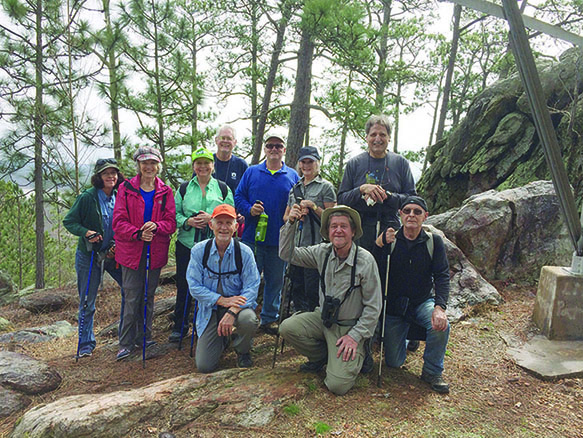
The Osher Lifelong Learning Institute, better known as OLLI at Auburn, provides academic, non-credit programming for adults age 50 and older. OLLI members participate in a variety of activities, including academic courses, social activities, lectures, workshops, and other special events.
OLLI at Auburn began as the Academy for Lifelong Learners, AUALL, in the Spring of 1990, under the vision of Dr. Mary Burkhart. Serving a local student base of adult learners, the successful program inspired many similar programs across Alabama and the region. AUALL applied for and received funding from the Bernard Osher Foundation in 2007 and became one of the first national links of Osher Lifelong Learning Institutes, OLLI at Auburn University.
Increasingly, older adults nationwide are participating in some 120 OLLI institutions across the United States. These educational programs all have a common thread of lifelong learning which incorporates fun-filled activities and social engagement, and also promotes cognitive well-being. Each is a part of a college or university and is funded in part by the Bernard Osher Foundation. All Osher Institutes offer a wide variety of intellectually stimulating, universitylevel, non-credit courses and learning opportunities designed for people “50 and better.” Many offer lectures and educational opportunities that build a sense of community and camaraderie among their participants.
OLLI at Auburn remains a unique and successful lifelong learning program, providing educational and social initiatives to its members as well as outreach to the community at large. OLLI’s academic year begins with a general meeting featuring noted scholars and community leaders as speakers. There are three main terms each year–fall, winter and spring–and one mini term during the summer featuring lectures and abbreviated classes. OLLI hosts social events each term open to members and guests, such as the general membership meetings in the fall and winter terms, open house events, back-toschool socials, spring socials, luncheons, and day trips such as our next trip to the Alabama Rural Studio in Hale County. OLLI at Auburn also offers programming through branch campus sites at Auburn University AUM in Montgomery and the Chambers County Public Library in Valley.
OLLI at Auburn has an annual membership fee of $25 and an academic fee for those choosing to take classes. The academic fee for the 2017-2018 year is as follows:
- Entire Year: $225.00 ($200 academic fee/$25 membership fee)
- Two Terms: $190.00 ($165 academic fee/$25 membership fee)
- One Term: $140.00 ($115 academic fee/$25 membership fee)
OLLI at Auburn, a program of the Office of the Vice President for University Outreach at Auburn University, is open to all interested people. OLLI administrative offices and select classes are located at the historic Sunny Slope property, 1031 South College St. in Auburn. For more information about OLLI at Auburn, contact Ollie Director Ileeia A. Cobb, Ph.D., at 334-844-3105, olli@auburn.edu, or visit the website at www.olliatauburn.org.
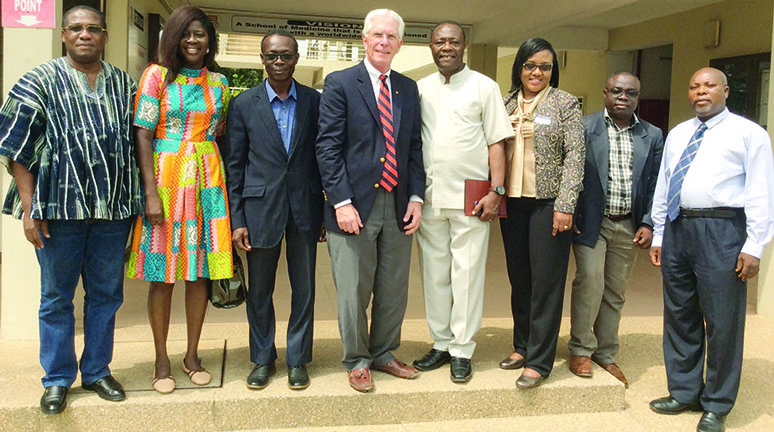
Outreach Global has successfully implemented a model of identifying and partnering with both internal and external strategic partners. Using this process that employs identification of strategic partners and communities, performance of needs assessment, and provision of functional and practical solution to both academic and non-academic issues has resulted in successful collaborative engagements within Auburn’s campus and externally with global partners.
Internally, Outreach Global has collaborations with faculty, departments, and colleges including the College of Education, Outreach units, Osher Lifelong Learning Institute (OLLI) and the School of Nursing. One such partnership focuses on global health issues. The office, in collaboration with the school of nursing, has instituted the Annual Ghana Healthcare program in two adopted cities: Nkanfoa, Cape Coast and Sekondi, Ghana.
Designed as an alternative spring break, the program offers volunteering opportunities for Auburn nursing students and faculty. Participants in the program will assist in providing free primary health care services at the adopted cities.
In October 2017, Royrickers Cook, vice president for University Outreach accompanied by Elizabeth I. Essamuah-Quansah of Outreach Global entered into an agreement with a member of Parliament of Sekondi, Andrew Mercer Snr., and met with the Minister of Central Region, Kwamena Duncan to launch the annual healthcare program.
In January, Professor Greg Newschwander, dean of the School of Nursing, and Elizabeth Essamuah-Quansah, visited the sites in Cape Coast and Sekondi where the Annual Healthcare program is scheduled to take place. The goal for the health program is to expose and provide the opportunities for school of nursing students, faculty and other participants to learn about the diverse healthcare systems and needs at the two selected cities in Ghana, and provide global outreach services.
Another successful partnership has been developed with OLLI. To spark interest in African engagement, Outreach Global partnered with OLLI to offer Ghana: An Overview of History, Education, Culture, Tourism and Economy as well as another course on Cultural Immersion on Ghana which seeks to fully expose individuals to opportunities in Ghana and other African countries. The aim is to delve into African countries each semester and offer some insight on various opportunities in the continent.
Externally, Outreach Global continues to develop strong partnerships with government officials in Africa, Asia, South America and North America. As Huxham (1996) stated, working with others promotes positive collaborative outcomes and it is this belief that the Outreach Global office encourages other departmental outreach units to collaborate and/or partner with the Outreach Global office to fulfill the AU global outreach collaborative mission.
For more information about Outreach Global’s program, visit: http://www.auburn.edu/outreach/global/ or contact the office at 334-844-5716.
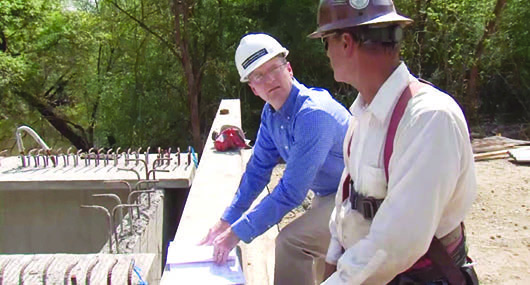
Technology is rapidly evolving every day. In our fast-paced world, industry professionals are balancing work and life demands while also seeking additional training and education to be successful in their field. The Samuel Ginn College of Engineering is doing its part to match these demands through its online educational offerings.
Auburn Engineering Online and Continuing Education will offer the Master of Engineering which allows students to design a specific degree tailored to fit their needs. The interdisciplinary degree will be available in the fall, pending approval from the Alabama Commission on Higher Education.
Students may select courses from the following eight engineering disciplines to earn a degree that will not only increase professional opportunities, but may also be completed at one’s online convenience.
- Aerospace
- Chemical
- Civil
- Computer Science and Software
- Electrical and Computer
- Industrial and Systems
- Materials
- Mechanical
To graduate with a Master of Engineering, students are required to create a plan of study and complete 30 credit hours of engineering graduate-level coursework. In addition, 21 of those hours must be a 6000-level and above engineering course. The remaining nine hours may be completed outside of the College of Engineering. Students who have received a bachelor’s degree from an accredited United States institution in an engineering-related discipline will not be required to take the GRE. The GRE may also not be required for individuals who have the engineering background needed for the program, but do not have an engineering degree.
“The Master of Engineering degree is unique in that it attracts students from all engineering disciplines,” said Christopher B. Roberts, dean of the College of Engineering. “Our mission is to provide access to the highest quality engineering education and that’s exactly what we’re accomplishing through this online degree. Students will have the advantage of earning an Auburn Engineering graduate degree at their convenience and use the degree to fulfill their professional goals.”
For those interested in continuing their education, but may not be ready to pursue a graduate degree, graduate certificates permit students to take individual courses in their chosen area of interest. This option allows individuals to continue building their knowledge in a specific area while also receiving credit. If an individual applies to Auburn Engineering’s online program, any earned certificates may be applied toward that student’s degree. The GRE is not required to enroll and there is no limit to the number of certificates a student may earn.
“The graduate certificates offer an excellent opportunity for engineering professionals who want to take a few courses to further their knowledge in their area of expertise,” said Greg Ruff, director of Auburn Engineering Online and Continuing Education. “Our graduate certificates allow students the flexibility to take courses, grow in their career and work toward a master’s degree in the future if they choose to do so.”
To learn more about our online programs and graduate certificates please visit: http://eng.auburn.edu/online/graduate-programs/index.html.
The 2017 GEDI Policy Summit, held in November, brought together Alabama state, county and municipal elected officials, administrators, employees and major stakeholders to discuss public policy issues affecting Rural Alabama. This year’s theme was “Blueprint for Rural Alabama.”
Keynote speaker Liz Huntley discussed “The Importance of Alabama Pre-K Education.” Presentations and round table discussions explored rural health care, schools and workforce, as well as community and economic development. The summit also hosted a legislative panel featuring local and state elected officials.
Plans are underway to make the GEDI Policy Summit an annual event.
The Economic Development Association of Alabama Leadership Institute educates and engages elected officials, economic development board members, and other community leaders about key issues in economic and community development. The focus is on students earning an EDAA Leadership Institute Certificate to obtain a well-rounded education.
Classes will utilize economic development practitioner experts as instructors and panelists so elected officials and other program participants learn about local resources and issues and build relationships with key local/regional economic development leaders. In order to earn an EDAA Leadership Certificate, participants must complete four one-day courses and attend at least one summer or winter EDAA Conference.
Upcoming classes are listed below.
Attracting Retail
Topics included are: retail development–opportunities and challenges, trends in retail development, planning for retail development and retail success strategies.
- Sept. 21, Prattville
- Oct. 11, Hoover
- Nov. 28, Auburn
Essentials of Economic Development
Topics covered will include: What is economic development, Keys to successful business recruitment, a panel of local/regional economic developers, and an audience engagement session discussing regional opportunities, challenges and success strategies.
- May 10, Hoover
Business and Industry Marketing and Attraction
Topics covered are: data-driven marketing techniques, community marketing and branding, social media and online targeting, internal and external support, identifying and engaging audiences, relocating and expanding businesses
- May 16, Gadsden
For more information visit www.auburn.edu/gedi/edaaleadership or call 334-844-4782.
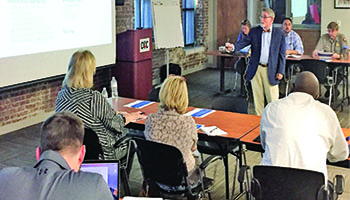
The Government and Economic Development Institute recently completed a project for the Tennessee Valley Authority developing a regional Tourism Strategic Plan for the 17-County TVA service region in North Alabama. Project partners included the Alabama Department of Tourism, the Alabama Mountain Lakes Tourist Association and numerous Extension offices and stakeholders.
A tourism asset inventory and a demographic and economic analysis was completed and strategic planning sessions, surveys and focus groups were conducted. The strategic plans provided strategies for key issues that included product development, organization and collaboration, workforce, education and outreach, marketing and infrastructure.
“The findings from this project provide a wealth of information for North Alabama tourism stakeholders,” said Dr. Joe Sumners, executive director of GEDI. “The region has many wonderful assets related to nature-based, cultural, and heritage tourism. The plans developed during this project should help regional leaders develop tailored strategies to take maximum advantage of these resources.”
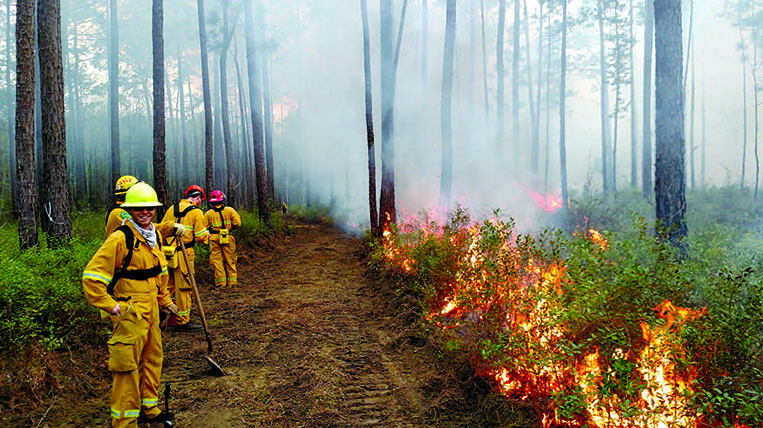
For the first time in its history, the national Wildland Firefighter Apprenticeship Program is providing training in the eastern U.S. at the Auburn University Solon Dixon Forestry Education Center in Andalusia, Alabama. The training course, also known as WFAP, dates back to 1989 and is traditionally held in Sacramento, California.
The WFAP has trained over 2,000 apprentices in wildland firefighting and prepared them for a future as fire managers. Wildland firefighters are dispatched to fight wildfires on national forests throughout the nation, including Alabama’s four national forests–Bankhead, Conecuh, Talladega and Tuskegee.
In February, 48 wildland firefighter apprentices attended the first WFAP academy held at Auburn’s Solon Dixon Forestry Education Center. They attended classes about fire behavior, fire suppression tactics, weather, safety, leadership, risk management and incident command, all taught by seasoned fire experts.
During the training course at the Solon Dixon Forestry Education Center, the apprentices gained hands-on field experience with situational awareness and tactical decision making, while practicing safety and teamwork skills.
“The Wildland Firefighter Apprenticeship Program develops our future fire and aviation managers in an innovative and unique educational experience, combining classroom and field-based hands-on education at the Dixon Center,” said Heath Cota, director of WFAP.
Participating agencies included the U.S. Forest Service, U.S. Fish and Wildlife Service, the National Park Service, Bureau of Land Management and Bureau of Indian Affairs.
The Dixon Center’s more than 5,300 acres feature fresh water springs, longleaf pine forests, cypress swamps, frontage along the Conecuh River and the National Forest. According to Dixon Center Director Joel Martin, this mix of diverse ecosystems makes the Dixon Center an excellent outdoor learning environment for forestry and natural resources management.
“At the Dixon Center, students have the unique opportunity to take what they have learned from their classroom instruction and in the same day, put that ‘theory into practice’ within our longleaf pine forests,” said Martin.
The Solon Dixon Forestry Education Center was created in 1978 with an initial monetary donation and 80-acre gift of land to Auburn University by the late forestry pioneer, Solon Dixon and his recently passed widow, Martha Dixon. This land would later combine with another larger deed of property–at the time the largest of its kind in Auburn’s history–to create the Solon Dixon Forestry Education Center, a 5,350-acre forestry and wildlife conservation education facility operated by the Auburn School of Forestry and Wildlife Sciences.
Located only hours from numerous major cities, the Solon Dixon Forestry Education Center includes the 6,500 square-foot Solon and Martha Dixon Foundation Learning Center, a state-of-the-art auditorium, classroom and conference room; two large bunkhouses, five semi-private dormitory buildings, a rec center, administrative building, classroom and computer lab building, maintenance shop, and cafeteria.
“The center is really ideal for this type of long-term immersive training. Once a group arrives, all of their needs can be met without leaving the property. This is both convenient and helps students to focus for longer periods, while reducing travel expenses – all things that ultimately lower training costs.”
“The Dixon’s vision for this land was to support excellence in forestry education,” said Janaki Alavalapati, dean of the School of Forestry and Wildlife Sciences. “We know the Dixons would be very proud the WFAP recognizes the quality of instruction and experiential learning that can be gained here.”
More information about the Solon Dixon Forestry Education Center can be found online at http://sdfec.auburn.edu. More information about the WFAP can be found online at https://www.nafri.gov/wfap/
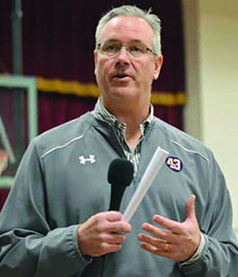
The father of former Auburn football great Philip Lutzenkirchen delivered a powerful message in February at the inaugural INSPIRE-AU lecture in Auburn.
Mike Lutzenkirchen shared the story of his son’s legacy, including the decisions that led to his tragic death and his positive impact on others—from sick children he spent time with to football players he coached as a volunteer.
Philip was a standout tight end at Auburn and a member of the 2010 National Championship team. His father, who started a foundation to honor his son’s legacy after his death from an automobile accident in 2014, talked about the importance of being available for others.
“We are put on this earth to give back to the life of others,” Lutzenkirchen said. “The Lutzie 43 Foundation allows me to do this and makes me so proud of who my son is.”
Lutzenkirchen began to understand philanthropy in a different way after his son’s death, when he learned how the talented tight end quietly reached out to others.
“I believe tithing is more than just ‘giving in church’,” he said. “Tithing is the gift of your talents, treasure, time and tenderness. And that is what is crucial for everyone to understand.”
Philip Lutzenkirchen died in an automobile accident in 2014 after a night out drinking with his friends. His father challenged Auburn students in the audience to be more than a “good friend” who goes along with the crowd. He said “great friends” do what’s right no matter the circumstances.
Lutzenkirchen spoke candidly about his son’s blood alcohol level the night of his death. He also told the audience wearing a seatbelt could have saved his son’s life.
Since his son’s death, Lutzenkirchen his carried his message to more than 300 schools and organizations around the country.
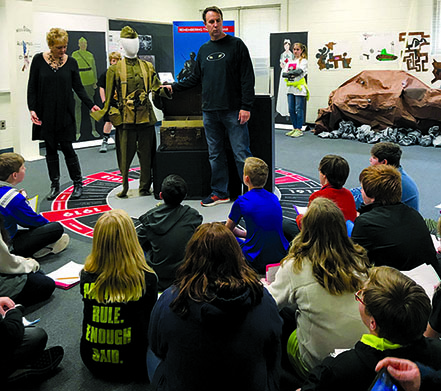
“Remembering the Great War,” a traveling exhibit on Alabama and World War One created at Auburn University, launched in March, 2017 and began its tour around the state to historical societies, museums, community colleges and commemorative events. The exhibit commemorates the centennial anniversary of the state’s involvement in World War I.
As the exhibit continued its state-wide tour in the fall, sixth-graders at Drake Middle School were involved in their own study of World War I. Throughout the month of January, social studies teacher Beverly Helm and around 50 of the Drake students continued to explore the topic. They were looking forward to Drake’s hosting “Remembering the Great War” for a week and a half beginning Jan. 27, the 17th stop on the tour, and to presenting it to the public Feb. 1.
To pair with the exhibit, the students did their own research on various aspects of the war, made posters and banners and created decorations. For the public exhibition, the team of students was on hand to offer additional information on the displays, artifacts and themes of the exhibit.
The team also served as exhibit guides for other students at the school. Students who visited the exhibit went on a “scavenger hunt” to collect facts and glean information from the displays, posters and artifacts it contains. Helm said about 560 students came through the exhibit in two days, so to help them do in-depth research, they had a question sheet with key points to find on the different displays.
"Remembering the Great War was a collaborative historical learning experience which afforded our students the opportunity to research, learn, and teach their peers about the contributions of Alabamians during World War I,” said Sarah Armstrong, principal of Drake Middle School. “The opportunity to view historical artifacts and glean from the in-depth information provided in this exhibit left an indelible impact for all who participated in this tremendous experience. "
“Remembering the Great War” is a traveling exhibit created by the Caroline Marshall Draughon Center for the Arts and Humanities in the College of Liberal Arts at Auburn University and the Alabama Department of Archives and History, with assistance from Associate Professor Shu-Wen Tzeng and Industrial Design students in the College of Architecture, Design and Construction.
For more information on the traveling exhibit, go to www.aub.ie/greatwar.
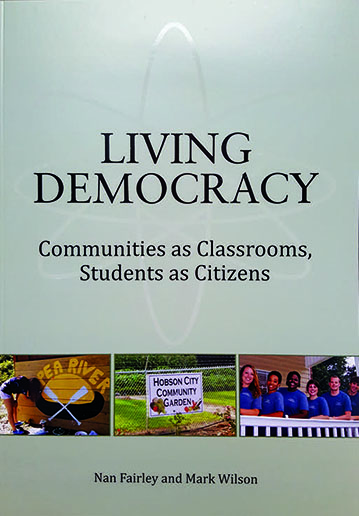
In a new book, “Living Democracy: Communities as Classrooms, Students as Citizens,” Nan Fairley and Mark Wilson describe the inception of Auburn’s Living Democracy program and the work of students and community members who have made, and continue to make, a journey of discovery in diverse Alabama communities. Program information can be found online at http://www.auburn.edu/livingdemocracy.
Fairley is associate professor of journalism in the School of Communication and Journalism, and Wilson is director of civic learning initiatives and the Caroline Marshall Draughon Center for the Arts and Humanities in the College of Liberal Arts.
Launched in 2011 and now a collaboration with the David Mathews Center for Civic Life in Alabama, Living Democracy is a 10-week, living-learning experience for undergraduate students focused on civic engagement and community assets. The book, published by the Kettering Foundation Press, explores what the Living Democracy model can mean in the context of both civic engagement and higher education. It also describes the benefits, as well as the challenges, of the living-learning experience for both community partners and students.
The book features essays by Cristin Foster Brawner, executive director of the David Mathews Center for Civic Life; Ralph Foster, assistant vice president and director of Auburn’s Office of Public Service in University Outreach; and Marian Royston, a 2012 alumna of the Living Democracy program and now teacher at Handley Middle School in Roanoke.
For more information on the book, go to www.kettering.org/catalog/product/living-democracy.
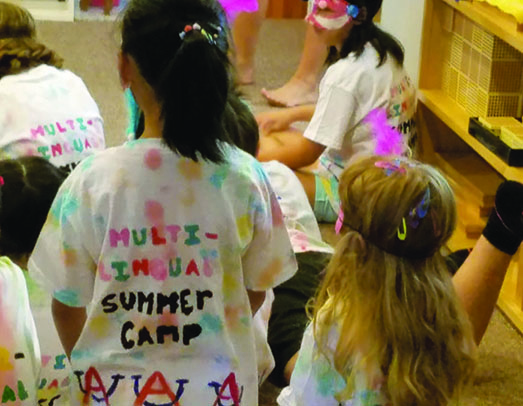
Auburn University’s Center for Educational Outreach and Engagement (CEOE) is partnering with Synchro International Education to provide a multilingual afterschool program that offers a mix of academic and recreational multilingual study on campus.
This program will serve K-12 students in the Auburn- Opelika area. The objective of the program is to prepare the students for successful careers in the global economy by developing their language skills and cultural awareness. A native English speaker with proficiency in Chinese and Spanish will be able to communicate with about 35% of the world’s population, giving them a unique advantage over others in navigating through the rapidly changing global economy.
Classes run in fall and spring for Spanish, Chinese and ESL (English as a Second Language) and there is a full-day summer program (not including ESL). For more info, contact auafterschool@auburn.edu or visit www.aub.ie/ceoe
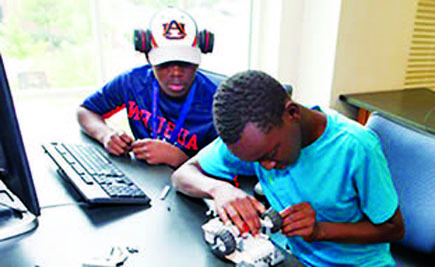
February Robo Camp, held 4 Saturdays in February, is a program developed by the Department of Computer Science and Software Engineering to introduce students to computer science and computational thinking concepts and hands-on applications using different computer and robotics programming frameworks. MIT App Inventor, Microsoft Kodu (http://www.kodugamelab.com/), Lego Mindstorms NXT, Lego EV3 and Lego Tetrix robots (http://www.lego.com), and 3D printing are only a few of the programming frameworks used for hands-on applications. The program is developed and directed by faculty member Daniela Marghitu and taught by students from the department.
Summer Robotics camps will be available also specifically for girls through the same department. Computer Science 4 All Girls (CS4ALL-G), geared to 4-8th grade girls, is designed to foster interest in Computer Science among middle and high school girls by providing an engaging and active programming development experience using CS Unplugged (CSU), CS For Fun (CS4FN), and Microsoft Kodu.
MAGIC (Mentoring Alabama Girls in Computing) is for high school girls who have an interest in computing and want to learn more about the ever-changing world of CS. The goal is to foster interest in the subject by providing an engaging and active programming development experience using CS Unplugged (CSU) kinesthetic activities (http://csunplugged.org/), Microsoft Kodu (http://www.kodugamelab.com/), and 3D printing to teach basic computer programming skills in a fun environment. For more information or to sign up for these camps, visit www.aub.ie/ceoe
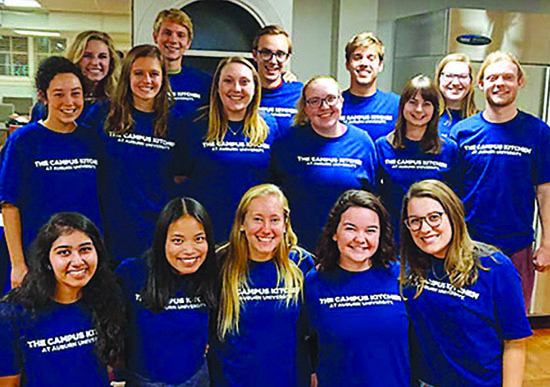
Auburn University’s recent 24-hour, online fundraising event, known as Tiger Giving Day, attracted more than 2,400 Auburn University alumni and friends, whose giving benefited the 31 projects featured. Of these projects, 23 were fully funded, some by as much as 310 percent. The remaining projects all achieved at least 50 percent of their goal. Both Outreach Projects were fully funded. All projects can be viewed at www.TigerGiving.org.
The Campus Kitchens Project can purchase supplies needed to package and deliver food to those in need. (156 donors, $8,386). “Campus Kitchens Feeds the Hungry” was funded at 139 percent.
The Osher Lifelong Learning Institute (OLLI) can add needed enhancements to their new home at Sunny Slope. (33 donors, $3,580 raised). “Help OLLI with Sunny Slope Enhancements” was funded at 143 percent.
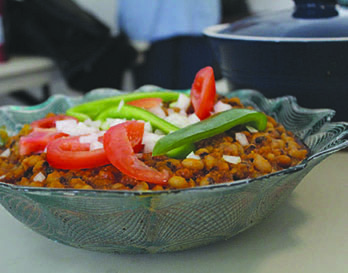
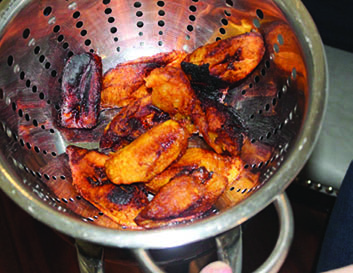
OLLI members in the Cultural Immersion-Ghana Class, taught by Dr. Elizabeth Essamuah-Quansah, learning how to make traditional Ghanian dishes! Interested in volunteering to teach a course? Our volunteer instructors, like Dr. Essamuah-Quansah, have found teaching to be a very rewarding experiance. For more information on teach with OLLI at Auburn, visit our site: www.olliatauburn.org/instructors.htm.
Dr.Quansah can be reached at eid0001@auburn.edu.
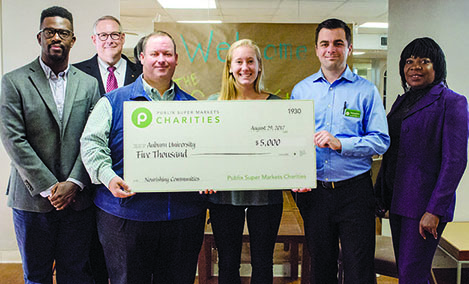
Publix Super Market Charities recently gave $5,000 to the Campus Kitchens Project to ensure that the student organization continues to have the resources necessary to meet hunger needs in the community - on and off cmapus.
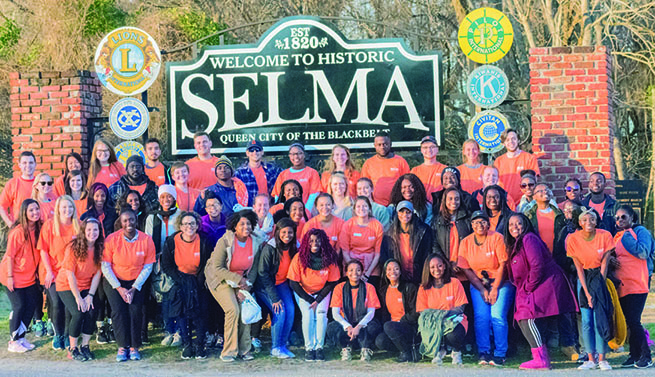
Auburn University’s Alternative Student Breaks and Black Student Union partnered to serve the city of Selma on Martin Luther King Jr. Day to honor King’s legacy.
Approximately 60 students from each campus organization participated in the service trip, and students assisted in community development by donating their time to the Selma Area Food Bank, Selma Community Center, SABRA Sanctuary, Crosspoint Church and Edmundite Missions.
“Student leaders in both organizations identified an opportunity to serve a few hours away in Selma while educating students on the historical significance Selma played in the civil rights movement,” said John-Michael Roehm, assistant director in the Office of Student Involvement. “This trip is a very affordable way for students to utilize their day off in a positive way.” This is the second year the two campus organizations partnered for the trip to Selma.
Participants had the opportunity to learn about the history of Selma, the site of several major civil rights events in the 1960s.
“We wanted to commemorate the incredible work Dr. King accomplished,” said ASB President Sydney Bayer. “What better way to do that than to give back to a community that Dr. King so immensely impacted?”
The union of the two student organizations demonstrates how coming together can help enhance the fulfillment for each of their missions, Roehm said. “Both students who attended and those who served were greatly benefitted.”
Alternative Student Breaks is a student-led service organization that takes service trips during all student breaks, including fall break, winter break, Martin Luther King Jr. Day and spring break.
The Black Student Union represents the interests and concerns of black students at Auburn University. Its mission, “Unity Through Education,” is core to all of the BSU’s events and activities.
For more information about Alternative Student Breaks and the Black Student Union or for ways to get involved, visit their pages at https://auburn.campuslabs.com/engage/organization/asb and https://auburn.campuslabs.com/engage/organization/bsu.
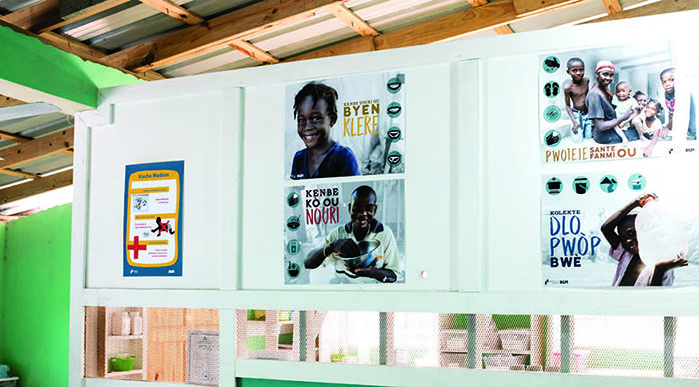
In Fall 2017, a group of Auburn University graphic design students were faced with the challenge of providing basic information about healthcare to the clients of the Hope Center clinic in Thoman, an isolated mountain village in Haiti. Because the majority of the clinic’s patients do not read or write, the challenge was to achieve this goal by creating posters that used visual images more than written language in order to convey important messages. The students worked under the direction of Robert Finkel, an associate professor in Auburn University’s graphic design program.
Finkel traveled to Haiti in order to get an in-depth understanding of the conditions at the Thoman Hope Center, which is run by But God Ministries. There he received valuable insight from Laura Rader, the RN who manages the clinic, and was able to see first-hand what the specific needs of the clients were. “We wanted to use a model of design where you look closely at the specific context and people that you’re designing for,” said Finkel. “The patients have various illnesses and health concerns that need to be addressed, so the graphics needed to be catered to them.”
The students studied Haiti’s geography, history, visual culture, politics and economics, and subsequently narrowed their focus to the area around Thoman and the context of the Hope Center. Based on their research and the input received from Finkel, they produced digital drafts of a number of posters which they shared with Rader in Haiti. Rader provided crucial feedback through a Skype interview (for example: to use pump spray bottles to illustrate bug spray because her clients don’t use aerosol cans, or not to use illustrations with trash bins because the clinic’s patients typically burn all of their trash rather than using bins). The students also received helpful feedback from other sources. “One student had a friend who was fluent in Haitian Creole, so they were able to proof the students’ work,” said Finkel. “We had been putting text in French Creole, which is a different dialect, so phrases had to be reworded.”
After a demanding process of editing and reworking their designs, the students produced four posters, each of which had a specific theme. The posters were complemented with brochures. Finkel returned to Haiti with the finished work to receive direct feedback from Rader and the clients and staff of the clinic. “The trip was very enlightening,” said Finkel. “We hung a section of the posters in the clinic, and they are going to change them periodically. We look forward to learning if there are any positive changes now that the people who use the clinic have these graphics available to them.”
Finkel hopes to continue the project and deliver more posters in the spring of 2018. He is currently looking for local printers or artists who could collaborate on the project, which would help promote the local economy and make the project more sustainable. “The project was a wonderful opportunity for us,” said graphic design student Ivy Martin. “We were able to do something in the real world, and it felt great knowing that we were performing a service. We applied design principles to a social cause. The project made a significant impact on us and I believe it will inspire similar work in the future.”
Last Updated: October 23, 2018

